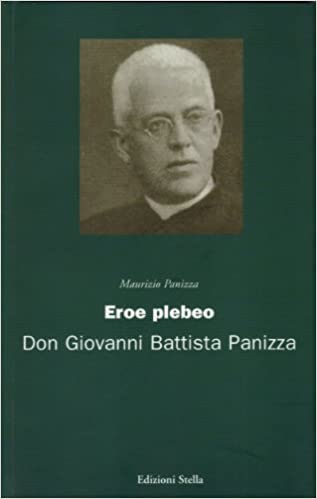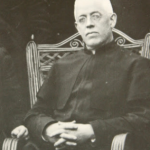Giovanni Battista was born in 1852 in Volano, in the Austrian Trentino, to a farmer family. He was charismatic and intelligent, he studied at the Diocesan Seminary in Trento and he continued his training in theology in Vienna.
He was appointed priest at the age of 25 and he began his activity also as a cooperative member in several villages of Trentino: first in Piazzola of Rabbi, then in Volano for two years and in Arco for another two years.
From 1886 until 1898 he was in Tuenno in Val di Non; it was an important period in which he compared himself more and more with the social reality that surrounded him and he experimented with the cooperative activity.
Society of that time was based on subsistence farming and the lands were shared into small properties: this made families of little land owners particularly subject to the developments of the harvest; if a year yielded little or there were bad weather conditions the family could easily fall into disgrace. Moreover, the practice of loan-to-loan was common and it aggravated the vicious circle of misery: it was a period of widespread poverty, malnutrition and the phenomenon of migration increased consequently. Having noted this also in the reality of Tuenno, Don Panizza joined the actions of don Guetti in Giudicarie and in the spirit of Encyclical Rerum Novarum by pope Leone XIII and he founds several social and cooperative institutes as a kindergarten, a women’s oratory and a sewing school. In 1894 the “Famiglia cooperativa” was born on his impulse and the year after it was the turn of the “Cassa Rurale”.
After moving to Lizzana he became promoter of various ventures for Vallagarina starting from 1990 (foundation of Famiglia Cooperativa in Lizzana, of the Society of Farmers in Vallagarina in 1908, president of the Agrarian Consortium in Lizzana and of Cantine riunite- combined wineries).
He was therefore a relevant figure for the cooperative movement in the whole Trentino: first federal manager and then President of the Consortium (the future Federation of Cooperation in Trentino) after don Lorenzo Guetti’s death, SAIT vice president (Agricultural Industrial Trade Union Trentino) and councillor of the Catholic Bank in Trentino. Don Panizza’s vision had a confessional tendency, set on him during the congress in Mori in 1899 and enhanced after a trip to the Reign of Italy, with don Silvio Lorenzoni and Emanuele Lanzerotti, aiming at getting to know the work of don Cerutti in Veneto and don Bonsignori in Brescia. He wanted in fact to get close to a cooperativism that was openly and exclusively catholic. Don Panizza’s confessional approach expressed support for the Catholic Bank of Trentino of which he was a councillor. During the federal Congress that was held in Trento on 15th April 1902 don Panizza, as President, expressed, with his unmistakable communicative style, the importance of ethical qualities of a cooperative member:
“As far as the moral order is concerned we must confess that if up to now we have succeeded in creating many cooperative societies, we weren’t also allowed to create many cooperative members. Too many are the cooperative members who concern the purely material, economic side of cooperation and not many are unfortunately those who know how to bring out and understand the beauty of cooperation in itself, its power, its necessity in front of the individual disintegration.
Too many lose themselves in stinginess and sacrifice the great and saint ideal of christian solidarity and brotherly union to the ephemeral profit of few cents.
Too many are those who see only a means of surer saving in their societies, and they treat all business uniquely on the financial side no more nor less than what any liberal would do.
Too many are those who judge cooperation solely by the material advantages it brings to their pockets and they don’t give any importance at all to the very noble intent that it decides, that is to elevate the masses long trampled and betrayed in every way by the libera system.
The great concept of common solidarity and the organic character of society are still missing, people don’t want to understand that all members of humanity, not just those of one family, of one country, but every member of humanity is mutually dependant and are obliged to services, like the members f a body, and then everyone thinks they have perfectly fulfilled their duties when they have
made their own interest and considered themselves excellent cooperative members only because they are attached to societies of which they are solely members because and until they bring material advantage to them. Very poor idea!”
In the general relation to the XII federal Congress, held in Trento in 1905, don Panizza summarised the federal events like this:
“Before cooperation was planted in our regions, individualism reigned supreme, and the population of our valleys, concerning the economic movement, was left to their own devices, and exploited by those who, welcoming the title of fathers of the homeland, people’s dukes and saviours of Trentino, always caused disharmony and never conveyed serenity”.
When the cooperative spark, thanks especially to a priest who was ardent with true love for the people, the unforgettable don Lorenzo Guetti, spread among our mountains, a new life, full of great actions, began to stir the abandoned masses, and an unanimous chorus of voices of multitudes, lifted up from neglect and unworthy servitude, rose up and said: "we are the land, we, tired of being softened up with big words as loud as fatuous by tutors who are incapable a thousand times, we must be enough and suffice to ourselves.
And it was then that a dense network of cooperative societies arose, up to the most remote villages, organised in big centers of the Federation, of the Catholic Bank and of the agricultural industrial trade union. Before this show of unexpected vitality, the first smiles of contempt of some people changed into smiles of wonder, wonder into resentment, resentment into fear ending up, forced by the evidence of things, acknowledging our right to state highly that we represent the country”.
Panizza’s years as federal president see a considerable increase in the number of member cooperatives; and head members are more than 40,000.
The cooperative commitment, as for many other contemporaries, intertwined with the political one; don Panizza was in fact among the founders of the Popular Party in Trentino.
At this point he was very well-known among farmers of the province and in 1907 he was elected with an almost plebiscitary amount of preferences at the election for the committee of Vallagarina for the Parliament of Vienna.
He was later deputy to the assembly of Innsbruck.
Furthermore during WWI he accompanied the parishioners of Lizzana, displaced in Moravia, and he was a member of the Central Refugee Relief Committee.
His descendant Maurizio Panizza questions the lack of notoriety of the family member in the cooperative remembrance of Trentino: “so, if don Guetti has the undoubted merit of being the first to have begun a new experience in Trentino, although managed only for 3 years, don Panizza has the recognition to have realised and improved the system of cooperation in Trentino (thanks also to his political commitment with the Popular Party, of which he is the first President, few years before Alcide Degasperi), a “system” that endured for over a century, arriving whole and strengthened to this day. In other words we could say that Guetti laid the foundation stone, while Panizza built the house and took care of its demanding maintenance in the first twenty years. How come then that don Guetti is considered the “Father” of cooperation in Trentino, whereas don Panizza is almost a stranger for the majority of people? It’s a totally legitimate question that can have many answers, all of them are ascribable to the origins of the movement anyway: laic or catholic and, therefore, Guetti or Panizza?
For these reasons a question is left pending: if thus catholic cooperation introduced to the land of Trentino a reality that brought wealth and prosperity until today, isn‘t maybe don Giovanni Battista the main creator?”
Quotes:
“Cooperation shouldn’t be judged purely by its material advantages, losing sight of its further goal: the enhancement of masses, the education of our people to independence, to class dignity and free and autonomous administration of their own goods.”
“Those who don’t feel in themselves the deep, powerful and active spirit of solidarity that we all share as a big family, are not cooperative members; those who hold on tight to their partnership only because and until when they have a personal profit, they are not cooperative members.”
“It’s not good first because the ‘Cooperativa’ is not a shop for profit only, but it has more important goals than material purposes:that means that it tends to moral improvement of its own members, using material improvements. And do you believe in improving the members’ morality by not observing the Sunday rest? ”
Among Panizza’s writing:
Giovanni Battista Panizza, Per il buon andamento delle società cooperative. Consigli, Trento, 1903

Per approfondire:
• Maurizio Panizza, Eroe plebeo. Don Giovanni Battista Panizza,Edizioni Stella, Rovereto, 2003
• Renzo Tommasi, Don Giovanni Battista Panizza cooperatore trentino, Provincia Autonoma di Trento, Trento, 2008
• F. Giacomoni, R. Tommasi, 100 anni di SAIT. Una storia del Trentino. Le radici della cooperazione di consumo trentina: 100 personaggi per 100 anni SAIT, 1999, pp 241-244


